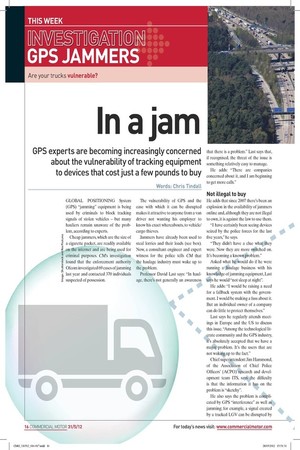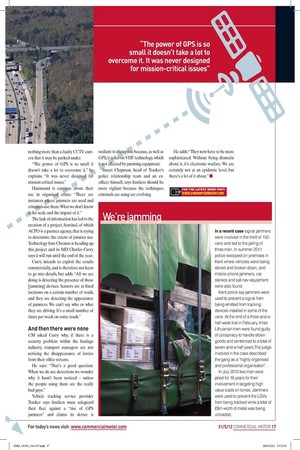In a jam
Page 13

Page 14

If you've noticed an error in this article please click here to report it so we can fix it.
GPS experts are becoming increasingly concerned about the vulnerability of tracking equipment to devices that cost just a few pounds to buy
Words: Chris Tindall
GLOBAL POSITIONING System (GPS) “jamming” equipment is being used by criminals to block tracking signals of stolen vehicles – but many hauliers remain unaware of the problem, according to experts.
Cheap jammers, which are the size of a cigarette packet, are readily available on the internet and are being used for criminal purposes. CM’s investigation found that the enforcement authority Ofcom investigated 69 cases of jamming last year and contacted 370 individuals suspected of possession. The vulnerability of GPS and the ease with which it can be disrupted makes it attractive to anyone from a van driver not wanting his employer to know his exact whereabouts, to vehicle/ cargo thieves.
Jammers have already been used to steal lorries and their loads (see box). Now, a consultant engineer and expert witness for the police tells CM that the haulage industry must wake up to the problem.
Professor David Last says: “In haulage, there’s not generally an awareness that there is a problem.” Last says that, if recognised, the threat of the issue is something relatively easy to manage.
He adds: “There are companies concerned about it, and I am beginning to get more calls.”
Not illegal to buy
He adds that since 2007 there’s been an explosion in the availability of jammers online and, although they are not illegal to own, it is against the law to use them.
“I have certainly been seeing devices seized by the police forces for the last five years,” he says.
“They didn’t have a clue what they were. Now they are more switched on. It’s becoming a known problem.” Asked what he would do if he were running a haulage business with his knowledge of jamming equipment, Last says he would “not sleep at night” .
He adds: “I would be raising a need for a fallback system with the government. I would be making a fuss about it. But an individual owner of a company can do little to protect themselves.” Last says he regularly attends meetings in Europe and the US to discuss this issue. “Among the technological literate community and the GPS industry, it’s absolutely accepted that we have a major problem. It’s the users that are not waking up to the fact.” Chief superintendent Jim Hammond, of the Association of Chief Police Officers’ (ACPO) research and development team ITS, says the difficulty is that the information it has on the problem is “sketchy” .
He also says the problem is complicated by GPS “interference” as well as jamming; for example, a signal created by a tracked LGV can be disrupted by nothing more than a faulty CCTV camera that it may be parked under.
“The power of GPS is so small it doesn’t take a lot to overcome it,” he explains. “It was never designed for mission-critical issues.” Hammond is cautious about their use in organised crime: “There are instances where jammers are used and criminals use them. What we don’t know is the scale and the impact of it.” The lack of information has led to the creation of a project, Sentinel, of which ACPO is a partner agency, that is trying to determine the extent of jammer use. Technology firm Chronos is heading up this project and its MD Charles Curry says it will run until the end of the year.
Curry intends to exploit the results commercially, and is therefore not keen to go into details, but adds: “All we are doing is detecting the presence of these [jamming] devices. Sensors are at fixed locations on a certain number of roads, and they are detecting the appearance of jammers. We can’t say who or what they are driving. It’s a small number of times per week on some roads.”
And then there were none
CM asked Curry why, if there is a security problem within the haulage industry, transport managers are not noticing the disappearance of lorries from their office screens.
He says: “That’s a good question. When we do see detections we wonder why it hasn’t been noticed – unless the people using them are the really bad guys.” Vehicle tracking service provider Tracker says hauliers must safeguard their fleet against a “rise of GPS jammers” and claims its device is resilient to disruption because, as well as GPS, it relies on VHF technology, which is not affected by jamming equipment.
Stuart Chapman, head of Tracker’s police relationship team and an exofficer himself, says hauliers should be more vigilant because the techniques criminals are using are evolving. He adds: “They now have to be more sophisticated. Without being dramatic about it, it’s electronic warfare. We are certainly not at an epidemic level, but there’s a lot of it about.” ■













































